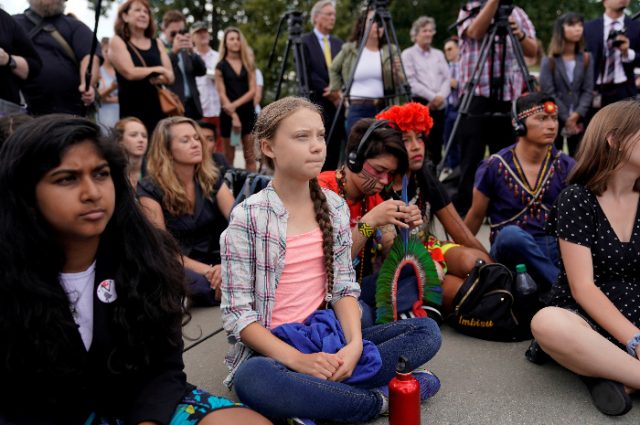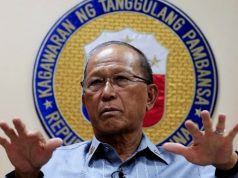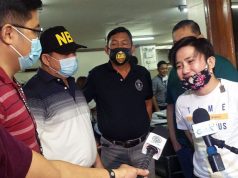
Swedish climate activist Greta Thunberg has joined other international personalities who called to revoke the newly signed anti-terrorism law in the Philippines.
President Rodrigo Duterte on July 3 signed the Republic Act No. 11479 or the Anti-Terrorism Act of 2020 despite widespread opposition from law and civic groups and activists due to fears that some of its provisions were perceived to trample on basic human rights and other civil liberties.
READ: Duterte signs anti-terrorism bill into law — spokesman
In a tweet last Monday, Thunberg encouraged her followers to support the calls of Filipino environmentalists or climate activists to junk the new controversial law.
She also used the hashtag #Junkterrorlaw which has been used by critics in their recent protests online and offline.
“Please support the climate activists in the Philippines!” Thunberg said.
Please support the climate activists in the Philippines! #JunkTerrorLaw @YACAPhilippines https://t.co/YrH3n4d3Nu
— Greta Thunberg (@GretaThunberg) July 6, 2020
She also retweeted Fridays for Future’s solidarity post with climate activists in the country. Fridays for Future is an international movement Thunberg started in 2018.
The international movement shared an invitation to an online rally against the new law schediuled last Saturday. It originated from a the post of local youth group Youth Advocates for Climate Action Philippines.
The account of YACAP was also tagged in the tweet.
“We stand in solidarity with climate activists in the Philippines. The Anti-Terror law puts climate activists and environmental defenders at risk of being tagged as terrorists,” the tweet read.
Four groups of concerned individuals and lawyers recently filed separate petitions before the Supreme Court to legally challenge the constitutionality of the anti-terror law and scrap it entirely.
Government agencies and senators who backed the measure earlier assured the public that they shouldn’t be afraid of it as long as their law-abiding citizens.
Thunberg started a worldwide phenomenon for young environmentalists in the world through her lone school strike every Friday from August to September 2018, which later fostered the “Fridays for Future” international campaign.
In September 2019, she organized another massive coordinated protest to protect the environment called Global Climate Strike.
Local organizations that participated include Greenpeace Philippines, Ilocos Norte Movement against Plastic Pollution and Haribon Foundation, and Zero Waste Pilipinas.
How are environmentalists affected?
In 2018, Global Witness, an international watchdog for environment and corruption, reported that the Philippines is the most dangerous place for environmental activists and indigenous communities due to the number of killings the previous year.
In a Facebook post last June 4, members of the Center for Environment Concerns-Philippines, an alliance of environmental groups, expressed fears that the attacks against them will aggravate should the then counter-terrorism bill be passed into law.
“The Anti-Terror Bill could be used to further intensify the already worsening attacks on environmental defenders,” said CEC-Philippines executive director Lia Mai.
Greens rally to oppose railroading of new Anti-Terror BillGreen groups under the Kalikasan People’s Network for the…
Posted by Center for Environmental Concerns – Philippines on Thursday, June 4, 2020
In a Twitter thread on July 3, following the law’s passage, YACAP explained the consequences if the provisions of the law are implemented.
“Our environment and land rights advocates, in particular, have already been the subject of trumped-up charges, threats, physical attacks, and killings before all this, and we can only expect that the Anti-Terrorism Bill will only make things worse for our environmental frontliners. All forms of activism and dissent are being threatened including climate activism,” part of the thread read.
Climate activists, unite to #JunkTerrorBillNow! The Philippines is already known to be the most dangerous country in the world for envi defenders, this will only make it easier to encroach upon the rights of our defenders &anyone who shows dissent against the government. (thread) pic.twitter.com/TvRCqjEFZM
— 🇵🇭Youth Advocates for Climate Action Philippines (@YACAPhilippines) June 3, 2020
National Security Adviser Secretary Hermogenes Esperon Jr. also previously said in an interview that some critics of the law might be terrorists.
“Doon sa definition ng terrorism, Section 4, sinasabi doon na hindi kasali ang mga dissent, advocacy, mass actions, at other similar exercise of civil and political rights. Nandoon mismo sa definition ng terrorism yan,” Esperon said.
“So anong sinasabi nila na mawawalan ng human rights? Palagay ko yung mga nagsasabi niyan, yung mga supporter ng mga terorista,” he added.









